-
ORIGINAL ARTICLE12-16-2024
Nursing team’s perceptions about care for pregnant women in a psychiatric unit
Revista Brasileira de Enfermagem. 2024;77(6):e20230186
Abstract
ORIGINAL ARTICLENursing team’s perceptions about care for pregnant women in a psychiatric unit
Revista Brasileira de Enfermagem. 2024;77(6):e20230186
DOI 10.1590/0034-7167-2023-0186
Views0See moreABSTRACT
Objectives:
to understand the nursing team’s perception in relation to the care provided to pregnant women with mental disorders admitted to a psychiatric hospital unit.
Methods:
Convergent Care Research carried out between August and December 2021, through semi-structured interviews with 25 nursing professionals from a Psychiatric Unit from a reference Hospital in Southern Brazil.
Results:
the organized and analyzed data resulted in two thematic categories: Technical, generic and impersonal care; and From impersonality to the singularity of nursing care. Ensuring unique care for pregnant women with mental disorders means giving them a meaning of existence and providing care from a multidimensional and continuous perspective.
Final Considerations:
nursing care for pregnant women in psychiatric hospitalization requires continuous professional qualification, interactive technologies and support for the nursing process, in addition to promoting singular and multidimensional care.
-
ORIGINAL ARTICLE12-16-2024
Bladder ultrasound: evidence of content validity of a checklist for training nurses
Revista Brasileira de Enfermagem. 2024;77(6):e20230183
Abstract
ORIGINAL ARTICLEBladder ultrasound: evidence of content validity of a checklist for training nurses
Revista Brasileira de Enfermagem. 2024;77(6):e20230183
DOI 10.1590/0034-7167-2023-0183
Views0See moreABSTRACT
Objectives:
to develop and analyze evidence of content validity of a checklist for training nurses in measuring bladder volume through ultrasound.
Methods:
a methodological study, consisting of three stages: literature review; instrument item preparation; and analysis of evidence of content validity. The Content Validity Index (CVI) and Gwet’s AC2 were used for content validity analyses.
Results:
the checklist consisted of 23 items. The CVIs for clarity, relevance and dimensionality were 0.99, 0.99 and 0.98 respectively, and the CVIs for Gwet’s AC2 with coefficients for clarity, relevance and dimensionality were 0.89, 0.97 and 0.95, respectively, with p<0.001.
Conclusions:
the checklist developed for training nurses in measuring bladder volume through ultrasound achieved adequate evidence of content validity, and can be used to train nurses in clinical practice and future research.

-
ORIGINAL ARTICLE12-16-2024
Childbirth care by health professionals: conflicting practices in obstetrics
Revista Brasileira de Enfermagem. 2024;77(6):e20230129
Abstract
ORIGINAL ARTICLEChildbirth care by health professionals: conflicting practices in obstetrics
Revista Brasileira de Enfermagem. 2024;77(6):e20230129
DOI 10.1590/0034-7167-2023-0129
Views0See moreABSTRACT
Objectives:
to understand the perceptions of women and health professionals regarding childbirth care at a teaching hospital in the western state of Paraná, Brazil.
Methods:
this qualitative study employed Grounded Theory, conducted in an obstetric care service with 38 participants (women and health professionals) through semi-structured interviews.
Results:
limitations in physical infrastructure and management of care, along with the women’s limited knowledge about the childbirth process and the decision-making and guidance of professionals, show conflicting obstetric practices-a discrepancy between good practices and obstetric violence. Training in obstetric nursing and active participation in care, alongside the presence of a companion, were identified as intervening conditions and strategies in the process.
Final Considerations:
childbirth care is characterized by dichotomous practices. While some professionals base their practices on scientific evidence, others rely on teachings and experiences from the time of their training.
-
ORIGINAL ARTICLE12-16-2024
A relação entre gênero, formação educacional e ambiente de aprendizagem com a ansiedade do estudante de enfermagem
Revista Brasileira de Enfermagem. 2024;77(6):e20220615
Abstract
ORIGINAL ARTICLEA relação entre gênero, formação educacional e ambiente de aprendizagem com a ansiedade do estudante de enfermagem
Revista Brasileira de Enfermagem. 2024;77(6):e20220615
DOI 10.1590/0034-7167-2022-0615
Views0See moreRESUMEN
Objetivos:
identificar las variables asociadas a la práctica clínica relacionadas con la ansiedad de los estudiantes de enfermería.
Métodos:
se utilizó un diseño descriptivo, cuantitativo, correlacional con las recomendaciones STROBE, EQUATOR. La población fue de 233 estudiantes de enfermería con una muestra de 135 personas. Los datos se recopilaron de marzo a abril de 2022 utilizando instrumentos validados.
Resultados:
la prueba de chi-cuadrado y razón de verosimilitud significativa para género, formación académica y entorno de aprendizaje son superiores a 0.05, por lo que no existe una relación significativa entre las variables y la ansiedad de los estudiantes.
Conclusiones:
los estudiantes necesitan prepararse nuevamente antes de ingresar al campo de la práctica. Investigaciones cualitativas también son necesarias.
-
ORIGINAL ARTICLE12-16-2024
The relationship between gender, educational background, and learning environment with nursing student’s anxiety
Revista Brasileira de Enfermagem. 2024;77(6):e20220615
Abstract
ORIGINAL ARTICLEThe relationship between gender, educational background, and learning environment with nursing student’s anxiety
Revista Brasileira de Enfermagem. 2024;77(6):e20220615
DOI 10.1590/0034-7167-2022-0615
Views0See moreABSTRACT
Objectives:
to identify variables associated with nursing students’ anxiety-related clinical practice.
Methods:
this study used a correlational quantitative descriptive design with the STROBE equator instrument. The population is 233 nursing students with a sample of 135. Data were collected from March to April 2022 using validated instruments.
Results:
the Chi-square test and the sig likelihood ratio on the gender, educational background, and learning environment is more than 0.05 so there is no significant relationship between the variables and student anxiety.
Conclusions:
students need to be prepared again before entering the practice field. Qualitative research is needed too.
-
ORIGINAL ARTICLE12-13-2024
Educational booklet on labor and delivery: validity study
Revista Brasileira de Enfermagem. 2024;77(5):e20240138
Abstract
ORIGINAL ARTICLEEducational booklet on labor and delivery: validity study
Revista Brasileira de Enfermagem. 2024;77(5):e20240138
DOI 10.1590/0034-7167-2024-0138
Views0See moreABSTRACT
Objectives:
to develop and validate an educational booklet on labor and delivery for pregnant women.
Methods:
this methodological study involved constructing and validating a booklet based on Echer’s framework. We used the Content Validity Index and Cronbach’s alpha for content and face validation, selecting judges according to Fering’s criteria. We then conducted a clinical validation with the target population.
Results:
the booklet, developed based on evidence from an integrative review and validated by judges and the target audience, achieved global Content Validity Index of 0.919 and 0.913, respectively. After clinical validation with 22 pregnant women, it included 28 topics and 48 pages, with illustrations by a graphic designer.
Conclusions:
expert judges and the target audience considered this educational technology valid, deeming it a relevant tool for promoting the health of pregnant women.

-
ORIGINAL ARTICLE12-13-2024
Knowledge and attitudes of nursing students regarding the sexuality of older adults: a quasi-experimental study
Revista Brasileira de Enfermagem. 2024;77(5):e20240011
Abstract
ORIGINAL ARTICLEKnowledge and attitudes of nursing students regarding the sexuality of older adults: a quasi-experimental study
Revista Brasileira de Enfermagem. 2024;77(5):e20240011
DOI 10.1590/0034-7167-2024-0011
Views0See moreABSTRACT
Objectives:
to compare the knowledge and attitudes of nursing students regarding sexual behavior and sexually transmitted infections (STIs) in older adults before and after an educational intervention.
Methods:
this quasi-experimental study involved a convenience sample of 45 nursing students from a public university, conducted in three stages: pre-intervention, intervention, and post-intervention. A questionnaire was used to assess sociodemographic characteristics, academic training, and knowledge and attitudes on the topic. The intervention was an educational web conference. Paired t-test and Wilcoxon test were used for data analysis.
Results:
there was a statistically significant difference in the knowledge and attitude scores of nursing students before and after the educational intervention (p < 0.001). A significant increase was observed in the knowledge score (from 9.3 to 12.2) and attitude score (from 108 to 117.2) in the post-intervention phase.
Conclusions:
the knowledge of nursing students regarding the sexuality of older adults increased after the educational intervention, and their attitudes on the subject became more positive.

-
ORIGINAL ARTICLE12-13-2024
Stress in nursing workers caring for people with COVID-19
Revista Brasileira de Enfermagem. 2024;77(5):e20230542
Abstract
ORIGINAL ARTICLEStress in nursing workers caring for people with COVID-19
Revista Brasileira de Enfermagem. 2024;77(5):e20230542
DOI 10.1590/0034-7167-2023-0542
Views0See moreABSTRACT
Objectives:
to analyze stress from the perspective of nursing workers caring for people with COVID-19 in a public hospital in the Recôncavo region of Bahia.
Methods:
this is an exploratory qualitative study, conducted through semi-structured interviews. The data were analyzed using word clouds, similarity trees, and content analysis.
Results:
nursing workers were exposed to stress while attending to patients with COVID-19. The reported stressors in the workplace included: work overload, lack of planning, speed in performing tasks, fatigue, lack of participation in decision-making, lack of support from management, technological changes, excessive responsibility without preparation, interpersonal conflicts, and professional undervaluation.
Conclusions:
exposure to these stressors leads to emotional exhaustion and demotivation, which were intensified during the COVID-19 pandemic.

-
ORIGINAL ARTICLE12-04-2023
Work-related stress among nurses in the COVID-19 pandemic: What are the contributing factors?
Revista Brasileira de Enfermagem. 2023;76:e20220586
Abstract
ORIGINAL ARTICLEWork-related stress among nurses in the COVID-19 pandemic: What are the contributing factors?
Revista Brasileira de Enfermagem. 2023;76:e20220586
DOI 10.1590/0034-7167-2022-0586
Views0See moreABSTRACT
Objective:
To analyze the contributing factors of work-related stress among nurses in the COVID-19 pandemic.
Methods:
A cross-sectional study was conducted with 101 nurse practitioners from two hospitals in West Java, Indonesia. We distributed an online questionnaire to evaluate work-related stress and the data were analyzed using ordinal logistic regression.
Results:
More than half of the nurses experienced moderate work-related stress. The study revealed that nurses aged over 35 years old had a lower likelihood of experiencing work-related stress (AOR: 0.173; 95%CI: 0.038-0.782). Married nurses had a higher likelihood (AOR: 7.156; 95% CI: 1.456-35.163). Additionally, nurses with low and moderate workloads had a lower likelihood (AOR: 0.003; 95%CI: 0.000-0.051) and (AOR: 0.025; 95%CI: 0.005-0.116), respectively.
Conclusion:
The consideration of age, marital status, and workload is essential in effectively addressing work-related stress among nurse practitioners.
-
ORIGINAL ARTICLE12-04-2023
Incidence and risk factors of pressure injuries in critically ill patients with COVID-19
Revista Brasileira de Enfermagem. 2023;76:e20220553
Abstract
ORIGINAL ARTICLEIncidence and risk factors of pressure injuries in critically ill patients with COVID-19
Revista Brasileira de Enfermagem. 2023;76:e20220553
DOI 10.1590/0034-7167-2022-0553
Views0See moreABSTRACT
Objective:
to analyze pressure injury (PI) incidence and risk factors in patients with COVID-19 admitted to an Intensive Care Unit and characterize the identified PIs.
Method:
a retrospective cohort study, consisting of 668 patients, carried out between March 2020 and February 2021. Clinical/demographic and PI variables were collected from medical records and electronic database. Data were analyzed using descriptive and inferential statistics. Logistic regression was performed to analyze risk factors for PI.
Results:
PI incidence was 30.2% (n=202), with the majority located in the sacral region (52.9%) and in stage 1 (39%). Risk factors were age (p<0.001), Diabetes Mellitus (p=0.005), length of stay (p<0.001), immunosuppression (p=0.034), nutritional risk (p=0.015) and mechanical ventilation (p<0.001).
Conclusion:
PI incidence in critically ill patients with COVID-19 was high.

-
EDITORIAL12-04-2023
Enfermagem e os Objetivos de Desenvolvimento Sustentável (ODS): Um Compromisso Essencial
Revista Brasileira de Enfermagem. 2023;76(6):e760601
Abstract
EDITORIALEnfermagem e os Objetivos de Desenvolvimento Sustentável (ODS): Um Compromisso Essencial
Revista Brasileira de Enfermagem. 2023;76(6):e760601
DOI 10.1590/0034-7167.2023760601pt
Views0Os Objetivos de Desenvolvimento Sustentável (ODS) são uma iniciativa global lançada pela Organização das Nações Unidas (ONU) em setembro de 2015 como parte da Agenda 2030 para o Desenvolvimento Sustentável, cujos objetivos sumarizam um apelo universal à ação para acabar com a pobreza, proteger o meio ambiente e garantir que todas as pessoas tenham acesso […]See more -
EDITORIAL12-04-2023
Nursing and the Sustainable Development Goals (SDGs): An Essential Commitment
Revista Brasileira de Enfermagem. 2023;76(6):e760601
Abstract
EDITORIALNursing and the Sustainable Development Goals (SDGs): An Essential Commitment
Revista Brasileira de Enfermagem. 2023;76(6):e760601
DOI 10.1590/0034-7167.2023760601
Views0The Sustainable Development Goals (SDGs) are a global initiative launched by the United Nations (UN) in September 2015 as part of the 2030 Agenda for Sustainable Development, whose objectives summarize a universal call to action to end poverty, protect the environment and ensure that all people have access to opportunities and well-being, all in an […]See more -
ERRATUM12-04-2023
ERRATUM
Revista Brasileira de Enfermagem. 2023;76(6):e2023n6e06
Abstract
ERRATUMERRATUM
Revista Brasileira de Enfermagem. 2023;76(6):e2023n6e06
DOI 10.1590/0034-7167.20237606e06
Views0In the article “Undergraduate nursing students’ knowledge and experience in infusion therapy and peripheral vascular acces”, with DOI number: , published in Revista Brasileira de Enfermagem, 2023;76(3): e20220219, authored:Where it read:[…]See more -
Elder abuse: a conceptual analysis
Revista Brasileira de Enfermagem. 2023;76(6):e20230150
Abstract
Elder abuse: a conceptual analysis
Revista Brasileira de Enfermagem. 2023;76(6):e20230150
DOI 10.1590/0034-7167-2023-0150
Views0See moreABSTRACT
Objective:
to analyze the concept of elder abuse and identify its respective antecedents, attributes and consequents.
Methods:
this is a conceptual analysis according to Walker and Avant’s proposition. The search for the concept was mediated by an integrative review in the LILACS, PubMed, CINAHL, Web of Science and BDENF databases.
Results:
as antecedents, female, family member, low social support and low income or socioeconomic conditions stand out. Attributes were threats and/or intimidation, intentional use of physical force, using resources without authorization, unwanted sexual activity, offering low insufficient amount of nutrients for older adults and not meeting older adults’ affective/emotional needs. Consequents were psychological disorders, dependence on aggressors, environment of insecurity and damage/loss of human rights or human dignity.
Final considerations:
the phenomenon under discussion is broad and multifaceted, suggesting expansion of studies related to the theme in order to explore it in detail.

-
ORIGINAL ARTICLE12-04-2023
Meanings of nurses’ role in Child and Adolescent Psychosocial Care Centers
Revista Brasileira de Enfermagem. 2023;76(6):e20230124
Abstract
ORIGINAL ARTICLEMeanings of nurses’ role in Child and Adolescent Psychosocial Care Centers
Revista Brasileira de Enfermagem. 2023;76(6):e20230124
DOI 10.1590/0034-7167-2023-0124
Views0See moreABSTRACT
Objective:
to analyze the meaning attributed to nurses’ role in mental health care in Child and Adolescent Psychosocial Care Centers.
Methods:
qualitative research, anchored in the paradigm of complexity. Data collection was carried out through online semi-structured interviews with ten nurses from São Paulo, between March and September 2022, being analyzed thematically.
Results:
the diversity and specificity of a child and adolescent mental health clinic, with the need for expanded, territorial and intersectoral care, were unveiled in addition to a fragmented training in the area. There was a need for a deconstruction of being a nurse to make it possible to produce more inclusive and salutogenic practices.
Final considerations:
the need for training nurses with adequate knowledge and skills to care for the mental health of children, adolescents and their families is reinforced as well as permanent education of working teams.
-
RESEARCH01-01-2017
Adherence to standard precautions in a teaching hospital
Revista Brasileira de Enfermagem. 2017;70(1):96-103
Abstract
RESEARCHAdherence to standard precautions in a teaching hospital
Revista Brasileira de Enfermagem. 2017;70(1):96-103
DOI 10.1590/0034-7167-2016-0138
Views0ABSTRACT
Objective:
analyze related factors and the level of adherence to standard precautions of nursing professionals from the clinical medical division of a teaching hospital.
Method:
a quantitative, cross-sectional, analytical study was conducted with 54 nursing professionals using the Psychometric Scale of Adherence to Standard Precautions, translated and validated to Brazilian Portuguese.
Results:
the global score of adherence was intermediate (4.41); no statistically significant correlation was observed between adherence and professional category (p=0.404) and length of professional practice (p= 0.612). A correlation was observed between ‘Washes hands after removing disposable gloves’ (p=0.026) and professionals with nursing practice above 10 years.
Conclusion:
adherence to standard precautions by the nursing team was intermediate, with no statistically significant difference in relation to the professional category and length of professional practice.
Keywords:Exposure to Biological AgentsNursing, TeamOccupational RisksPersonal Protective EquipmentUniversal PrecautionsSee more
-
RESEARCH01-01-2017
Analysis of adverse events following immunization caused by immunization errors
Revista Brasileira de Enfermagem. 2017;70(1):87-95
Abstract
RESEARCHAnalysis of adverse events following immunization caused by immunization errors
Revista Brasileira de Enfermagem. 2017;70(1):87-95
DOI 10.1590/0034-7167-2016-0034
Views0See moreABSTRACT
Objective:
to analyze adverse events following immunization (AEFI) caused by immunization error in the state of Paraná, Brazil, from 2003 to 2013.
Method:
this is a descriptive, documental, retrospective, and quantitative research using secondary data from the Adverse Event Following Immunization Information System and the Immunization Program Evaluation System. We included cases confirmed and/or associated with different types of vaccines. For the analysis, we collected frequencies and incidence rates, and used simple linear regression models with Student’s t-test.
Results:
it was observed an AEFI increase due to immunization errors, especially hot subcutaneous abscesses. BCG vaccine had the highest incidence of adverse events and children under one year old were the most affected individuals.
Conclusion:
the current scenario is worrisome because these are preventable AEFI – injuring patients due to bad vaccination practices – that may undermine the population’s confidence, reducing immunization coverage, and the progress in the control of vaccine-preventable diseases.

-
RESEARCH01-01-2017
Nursing practice environment and work satisfaction in critical units
Revista Brasileira de Enfermagem. 2017;70(1):79-86
Abstract
RESEARCHNursing practice environment and work satisfaction in critical units
Revista Brasileira de Enfermagem. 2017;70(1):79-86
DOI 10.1590/0034-7167-2016-0211
Views0See moreABSTRACT
Objective:
to analyze the association between the environment of nursing practices and work satisfaction in Intensive Care Units (ICU).
Method:
a cross-sectional study was performed in eight adult ICUs of a public university hospital between 2012 and 2015. The Nursing Work Index-Revised (NWI-R), in their short forms, and the Index of Work Satisfaction (IWS) were applied to investigate the environment of nursing practices and work satisfaction, respectively.
Results:
a total of 100 (34.84%) nurses and 187 (65.15%) nursing assistants/technicians participated in this study. The environment was favorable for autonomy and relationships and it showed vulnerability for control of practices and organizational support. The IWS score indicated low work satisfaction. “Environment of practices”, “length of work in the ICU” and “willingness to work” were associated with work satisfaction.
Conclusion:
to invest in the environment of practices, in factors that promote willingness to work and length of experience in the ICU increases nursing work satisfaction.
-
RESEARCH01-01-2017
Emergency interventions for air medical services trauma victims
Revista Brasileira de Enfermagem. 2017;70(1):54-60
Abstract
RESEARCHEmergency interventions for air medical services trauma victims
Revista Brasileira de Enfermagem. 2017;70(1):54-60
DOI 10.1590/0034-7167-2016-0311
Views0See moreABSTRACT
Objective:
to analyze emergency interventions for air medical services trauma victims, considering the time at the scene of trauma and the severity of the victims.
Method:
This was a descriptive, correlational and quantitative study, conducted from October of 2014 to December of 2015. Six nurses participated, completing an instrument containing emergency interventions performed in the care of victims after the occurrence of trauma. The sample consisted of 97 treatments.
Results:
Among the 97 for whom care was provided, peripheral venipuncture was performed in 97.94% of the cases; immobilization, including a backboard, was used in 89.70% of cases. The most commonly used medications were dipyrone in 44.33%, and ondansetron in 76.29%. The time on the scene showed significance with the severity of the victims. The Glasgow Coma scores were inversely related to time on the scene.
Conclusion:
Further studies are necessary, focused on care protocols for trauma victims
-
RESEARCH01-01-2017
Evaluation of the hospital accreditation program: face and content validation
Revista Brasileira de Enfermagem. 2017;70(1):47-53
Abstract
RESEARCHEvaluation of the hospital accreditation program: face and content validation
Revista Brasileira de Enfermagem. 2017;70(1):47-53
DOI 10.1590/0034-7167-2016-0184
Views0ABSTRACT
Objective:
to describe the results of face and content validation of the questionnaire entitled Quality Improvement Implementation Survey, and of two complementary scales as part of the adaptation process to the Brazilian language and culture.
Method:
included the following stages: (1) translation and synthesis of translations; (2) consideration by the expert committee; (3) back translation; (4) evaluation of verbal understanding by the target population.
Results:
the questionnaire was translated into Portuguese and its final version included 90 items. In the pre-test, the target population evaluated all items as easy to understand, with the global average of 4.58 (maximum value = 5).
Conclusion:
the questionnaire is currently translated into Portuguese and adapted to the Brazilian context. The adapted version maintained the semantic, idiomatic, conceptual and cultural equivalence, according to the assessment of the expert committee and the information provided by the target population, which confirmed the face and content validity.
Keywords:AccreditationAssurance of Health Care QualityHospital AdministrationOutcome Assessment (Health Care)Validation StudiesSee more -
RESEARCH01-01-2017
Adecuación de escalas para medir cargas de trabajo mediante metodología de calidad
Revista Brasileira de Enfermagem. 2017;70(1):39-46
Abstract
RESEARCHAdecuación de escalas para medir cargas de trabajo mediante metodología de calidad
Revista Brasileira de Enfermagem. 2017;70(1):39-46
DOI 10.1590/0034-7167-2016-0246
Views0RESUMEN
Objetivo:
Determinar cuál de las escalas evaluadas (NEMS y NAS), es más adecuada para Unidades de Cuidados Intensivos aplicando metodología de calidad.
Método:
Tras identificar como oportunidad de mejora la no adecuación de la escala NEMS para determinar cargas de trabajo de enfermería en UCI, se aplica metodología de los ciclos de mejora a dicha escala y a la NAS, como propuesta de mejora, evaluando los criterios: medición de cargas de trabajo al día y por turno, inclusión de todas las actividades enfermeras, y análisis por paciente y unidad.
Resultados:
Escala NEMS no muestra diferencias significativas en el cumplimiento (67%). Comparación NEMS-NAS, todos los criterios excepto el 1º, obtienen mejora significativa. NEMS sólo valora el criterio 1 (64,22%), y NAS todos con un cumplimiento para el 1º, 2º y 4º del 64,74%, y el 3º del 100%.
Conclusión:
La escala NAS es más adecuada para medir cargas de trabajo de enfermería en UCI.
Keywords:Carga de TrabajoControl de CalidadEnfermeríaGestión de la CalidadUnidades de Cuidados IntensivosSee more
Search
Search in:
Nuvem de Tags
Aged (144) Atenção Primária à Saúde (239) COVID-19 (104) Cuidados de Enfermagem (269) Educação em Enfermagem (151) Educação em Saúde (139) Enfermagem (930) Estudos de Validação (131) Health Education (144) Idoso (208) Mental Health (149) Nursing (987) Nursing Care (306) Patient Safety (151) Primary Health Care (284) Qualidade de Vida (104) Quality of Life (106) Saúde Mental (145) Segurança do Paciente (150) Validation Studies (108)





